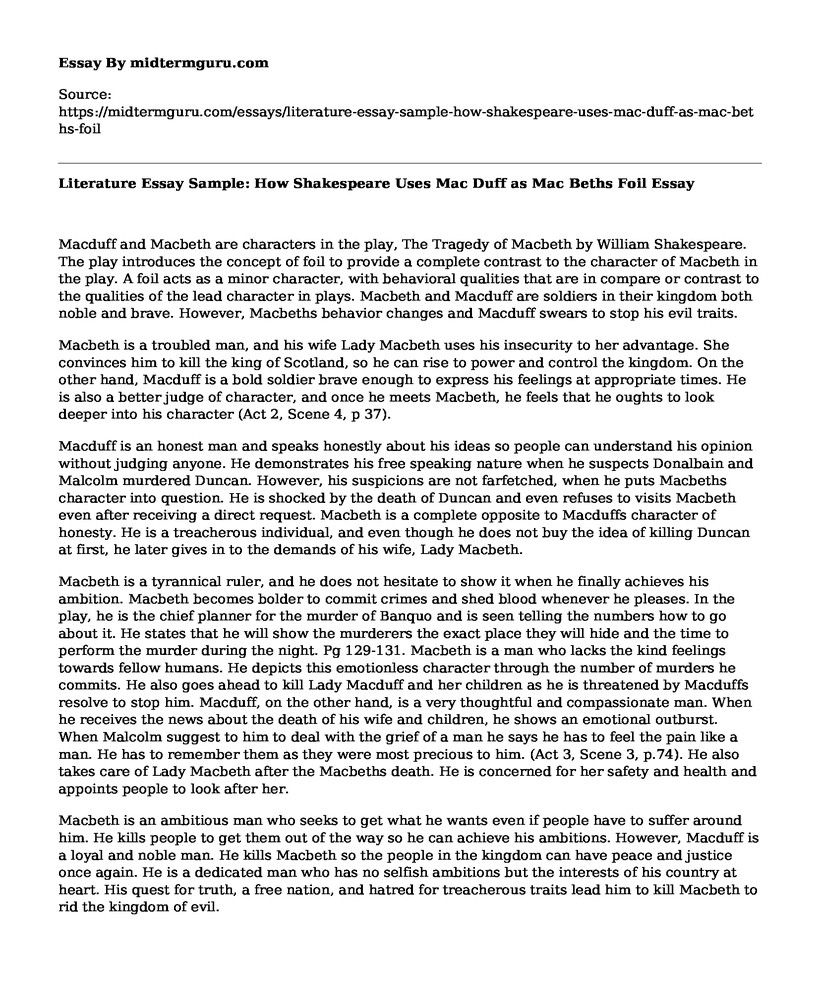Macduff and Macbeth are characters in the play, The Tragedy of Macbeth by William Shakespeare. The play introduces the concept of foil to provide a complete contrast to the character of Macbeth in the play. A foil acts as a minor character, with behavioral qualities that are in compare or contrast to the qualities of the lead character in plays. Macbeth and Macduff are soldiers in their kingdom both noble and brave. However, Macbeths behavior changes and Macduff swears to stop his evil traits.
Macbeth is a troubled man, and his wife Lady Macbeth uses his insecurity to her advantage. She convinces him to kill the king of Scotland, so he can rise to power and control the kingdom. On the other hand, Macduff is a bold soldier brave enough to express his feelings at appropriate times. He is also a better judge of character, and once he meets Macbeth, he feels that he oughts to look deeper into his character (Act 2, Scene 4, p 37).
Macduff is an honest man and speaks honestly about his ideas so people can understand his opinion without judging anyone. He demonstrates his free speaking nature when he suspects Donalbain and Malcolm murdered Duncan. However, his suspicions are not farfetched, when he puts Macbeths character into question. He is shocked by the death of Duncan and even refuses to visits Macbeth even after receiving a direct request. Macbeth is a complete opposite to Macduffs character of honesty. He is a treacherous individual, and even though he does not buy the idea of killing Duncan at first, he later gives in to the demands of his wife, Lady Macbeth.
Macbeth is a tyrannical ruler, and he does not hesitate to show it when he finally achieves his ambition. Macbeth becomes bolder to commit crimes and shed blood whenever he pleases. In the play, he is the chief planner for the murder of Banquo and is seen telling the numbers how to go about it. He states that he will show the murderers the exact place they will hide and the time to perform the murder during the night. Pg 129-131. Macbeth is a man who lacks the kind feelings towards fellow humans. He depicts this emotionless character through the number of murders he commits. He also goes ahead to kill Lady Macduff and her children as he is threatened by Macduffs resolve to stop him. Macduff, on the other hand, is a very thoughtful and compassionate man. When he receives the news about the death of his wife and children, he shows an emotional outburst. When Malcolm suggest to him to deal with the grief of a man he says he has to feel the pain like a man. He has to remember them as they were most precious to him. (Act 3, Scene 3, p.74). He also takes care of Lady Macbeth after the Macbeths death. He is concerned for her safety and health and appoints people to look after her.
Macbeth is an ambitious man who seeks to get what he wants even if people have to suffer around him. He kills people to get them out of the way so he can achieve his ambitions. However, Macduff is a loyal and noble man. He kills Macbeth so the people in the kingdom can have peace and justice once again. He is a dedicated man who has no selfish ambitions but the interests of his country at heart. His quest for truth, a free nation, and hatred for treacherous traits lead him to kill Macbeth to rid the kingdom of evil.
In conclusion Shakespeare used two different individuals to create a balance in morality and personality in people. The use of foil in the play demonstrates the characters of persons in the real world. Individuals who are kind often suffer while the evil people in the society get what they want. However, good deeds always prevail, and the bad people lose as Macbeth did in the play.
Cite this page
Literature Essay Sample: How Shakespeare Uses Mac Duff as Mac Beths Foil. (2021, Jun 08). Retrieved from https://midtermguru.com/essays/literature-essay-sample-how-shakespeare-uses-mac-duff-as-mac-beths-foil
If you are the original author of this essay and no longer wish to have it published on the midtermguru.com website, please click below to request its removal:
- The Biography of Harriet Jacobs Who Was Born as a Slave
- Essay on My Last Duchess by Robert Browning
- On Living: A Postscript by Stephen King - Literature Essay Example
- Literature Essay on the Theme of Social Class in King Henry V by Shakespeare
- Comparison of the Poems: To a Daughter Leaving Home by Linda Pastan and Departure by Glen Kirkland
- Literary Analysis Essay on A Doll's House
- Critical Essay on William Shakespeare's Literary Works







